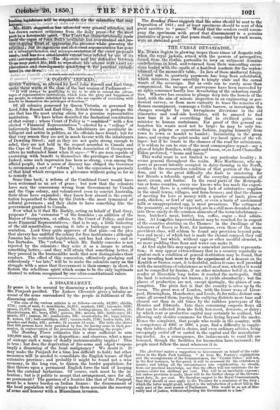CIIIIt".2" AA. .44 gle 1415. ! ' RPBSPU ad. Earl Grey, 4oke'these words
at the chase/Oilsat mien of Parliament- " It will always be gratifying to -file to be able to extend the advan- tages of representative institutions, which form the glory and happiness of my people, to colonies inhabited by men who are capable of exercising with benefit to themselves the privileges of freedom." Of all colonies possessed by Queen Victoria, or governed by Lord. John Russell and Earl Grey, British Guiana is perhaps the one that has the most crying claim for a genuine representative institution. We have before described the fantastical constitution of that colony ; whose Court of Policy is " combined" with a few elected " Financial Representatives "—elected by a " college" of ludicrously limited numbers. The inhabitants are peculiarly in- telligent and active in politics, as the officials have found; but for that very reason they are not in much favour with the inhabitants of Downing Street; and as they are not quite . strong enough to rebel, they are not held in the respect accorded to Canada and the Cape of Good Hope, The Reform Association of Georgetown utters no unfoanded boast when- it says—" We are men capable of exercising with benefit to themselves the privileges of freedom." Indeed, some such impression has been so strong, even among the official people, that a sense of decency has obliged the Governor towcommend a sort of " reform" ; but the concession is precisely of that kind which recognizes a grievance without going so far as
to remedy it. Some time back, a reform of the Combined Court would have been welcomed as an act of grace ; but now that the colonists have seen the concessions wrung from Government by Canada and the Cape colony, and volunteered even to convict Australia, their ideas have expanded ; they know how absurd is the consti- tution bequeathed to them by the Dutch—the most tyrannical of colonial governors ; and they claim to have something like the government granted to Canada.
Now what is it that Mr. Barkly, acting on behalf of Earl Grey, proposes ? An " extension " of the franchise ; an addition of the Mayor of Georgetown, ex officio, to the Court of Policy, and four more Financial Representatives,—that is to say, a little tinkering of the old constitution, coaxing it into a burlesque upon repre- sentation. Lord Grey quite approves of that ,plan—on the plea that slavery has unfitted the colony for free institutions ; although Jamaica has its veritable legislature, and has had slaves ; and so has Barbados. The " reform " which Mr. Barkly concedes is not rejected by the colonists : they seize it as a means to attain something better,—ancl they will attain that something better, if they proceed in the businesslike mode that now distinguishes their conduct. The effect of this concession, offensively grudging and ridiculously " too late," will be to make the colonists carry on the struggle with a sense that Government is their enemy: in short, it fosters the rebellious spirit which seems to be the only legitimate channel to reform recognized by onr ultra-constitutional rulers.


























 Previous page
Previous page